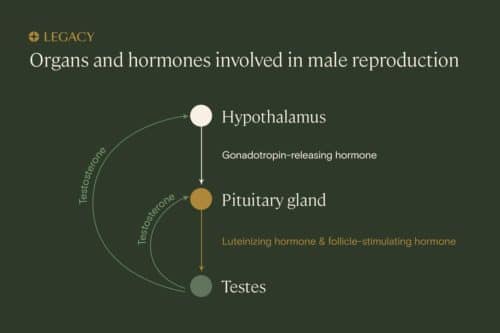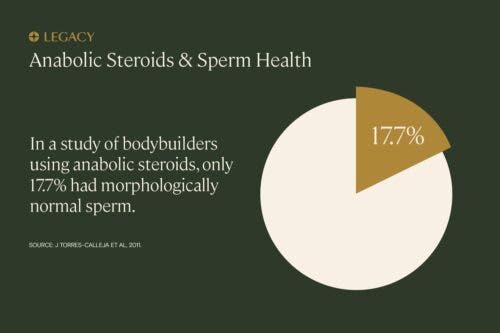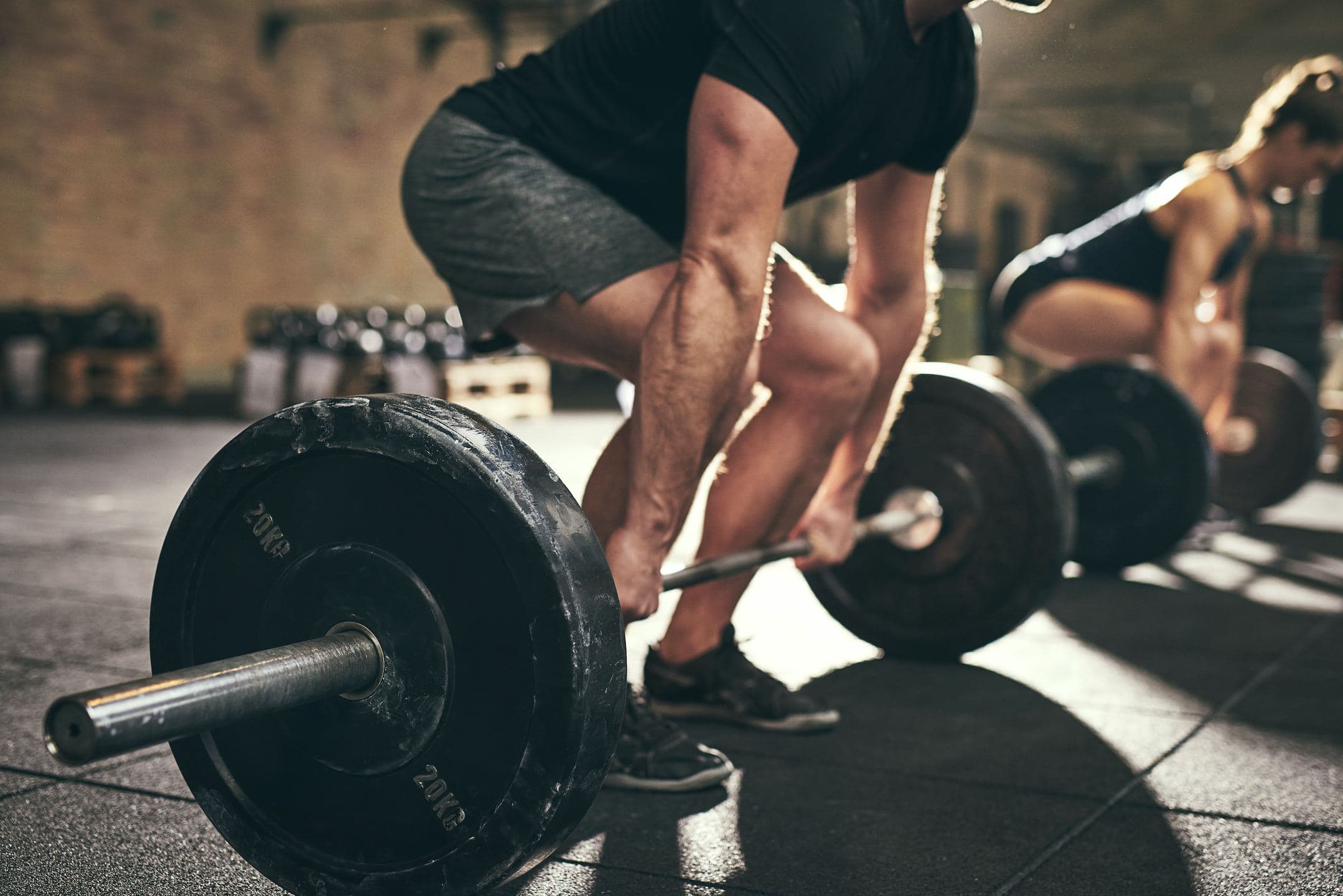Lifestyle factors play a big role when it comes to fertility and sperm improvement. And drug use, including the misuse of steroids, is one of those factors that can have a big impact. Do anabolic steroids affect male fertility? What about corticosteroids prescribed for chronic or short-term illness? Let’s find out.
What are anabolic steroids, and how are they used?
A “steroid” is a type of compound with a specific chemical structure, including many hormones, alkaloids, and vitamins. “Anabolic” refers to the process of building up (muscle or bone), also known as biosynthesis.
Anabolic steroids are natural or synthetic versions of testosterone. Anabolic steroids may be prescribed to address hormone deficiencies or help certain kinds of patients gain weight or muscle mass, such as those with cancer or AIDS. But because testosterone increases muscle mass, anabolic steroids may be misused by athletes and bodybuilders to help build muscle, lower body fat percentage, or gain strength and endurance in an attempt to quickly increase athletic performance.
In these cases of misuse, individuals are often aware of the dangers, and experiment with “cycling,” “stacking,” or “pyramiding” administration methods to try to bypass side-effects. However, there is no scientific evidence that proves any of these methods help reduce the probable short-term and long-term negative side effects—including the detrimental impact on sperm quality parameters and overall fertility.
How anabolic steroids affect fertility
From sperm quality parameters to testicular function, the misuse of anabolic steroids can have lasting effects on male fertility. Here’s what you need to know:

Sperm production
Certain hormones help regulate the male reproductive system. Testosterone, follicle-stimulating hormone (FSH), and luteinizing hormone (LH), are three key hormones that drive male fertility. A study that observed anabolic steroid use determined that intake of synthetic testosterone, like anabolic steroids, inhibits the secretion of both FSH and LH, which are fundamental to producing sperm. With these hormones inhibited, the body is unable to properly produce sperm. As a result, men taking anabolic steroids saw quality parameters, such as sperm count and concentration, plummet.
In most cases, these negative effects on sperm production were temporary, and could be reversed if the individual stopped taking anabolic steroids. Sperm quality parameters could be expected to normalize after 4 to 12 months of ending steroid use. However, in some cases, patients experienced up to 5 years of azoospermia, a medical condition where a male is unable to produce any sperm.
Multiple studies conclude that the use of anabolic steroids significantly decreased quality sperm parameters. One study compared 41 bodybuilders using anabolic steroids with 41 volunteers who did not use steroids or other drugs. Over half of the bodybuilders showed dramatically low sperm quality values, compared to just 12% of the male volunteers.
In a similar study of steroid-using bodybuilders, researchers found that only 17.7% of men with a history of using steroids had any morphologically normal sperm. And another study that followed 20 male bodybuilders using anabolic steroids over a 2-year period found that decreased fertility was one of the most significant long-term adverse effects.

Learn more about steroids and sterility.
Testicular function
Another long-term effect of chronic anabolic steroid misuse may be decreased testosterone production.
In a study that evaluated groups of three men—men who never used anabolic steroids, former anabolic steroid abusers, and current anabolic steroid misusers—it was found that anabolic steroid use has long-term effects on a male’s ability to produce testosterone. Of the three groups, current users of anabolic steroids had the lowest testosterone levels, and former users’ testosterone levels were notably lower than the group of men who never took anabolic steroids.
These findings suggest that the Leydig cells in the testes, which are responsible for producing testosterone, may become permanently impaired with steroid misuse. This shutdown of the function of the testes is known as “steroid-induced hypogonadism.”
Other side effects of anabolic steroids
Along with fertility, there are also other major areas users of anabolic steroids may experience. While many of these side effects may be reversed after cessation of steroid use, there are some instances where permanent damage may be done.
Cardiovascular system
Research shows that anabolic steroids can increase low-density lipoprotein (LDL) levels and decrease high-density lipoprotein (HDL) levels, which contribute to:
- High blood pressure
- Blood clots
- Heart attacks
- Stroke
- Artery damage
Hormone (endocrine) system
Anabolic steroid use disrupts normal hormone production in the body. While hormones play a big role in fertility and sperm production, there are other hormones that regulate vital areas and functions of the body. Hormonal imbalances brought on by anabolic steroid misuse can cause:
- Enlarged breast tissue
- Shrinking of the testicles
- Male-pattern baldness
- Testicular cancer
- Severe acne and cysts
- Oily scalp and skin
Musculoskeletal system
Use of anabolic steroids sends signals to the body. In adolescents, the surge of synthetic testosterone can signal the body to stop growing and stunt growth. For adults, studies show that individuals who use anabolic steroids tend to have stiffer tendons, which is linked to an increased risk of tendon injury.
- Short stature (if taken by adolescents)
- Tendon injury
Psychiatric effects
- Aggression
- Mania
- Delusions
You’re probably familiar with the term “roid rage.” Abusers of anabolic steroids can experience short-term, and in some cases, long-term psychiatric effects. In a study on adolescent steroid users, it was found that anabolic steroid users reported more anger, fights, and verbal aggression than non-users. Another study that focused on the long-term effects of adult men found that anabolic steroid abuse is associated with dependence syndromes, mood syndromes, and progression to other forms of substance abuse.
Other side effects
Anabolic steroid use may also cause:
- Abscess or infection at injection site
- Liver damage/jaundice
Do all steroids have the same impact on male fertility?
When people talk about steroid misuse, they are usually referring to the anabolic steroids that we’ve discussed here—the steroids that are made from or lookalikes for testosterone.
These are not to be confused with corticosteroids, which are prescription medications commonly used to help reduce inflammation and suppress the immune system. (Again, “steroid” just refers to a compound with a specific chemical structure.) Corticosteroids are used to treat a variety of conditions, like asthma, arthritis, eczema, lupus, and multiple sclerosis, as well as short-term infections that cause inflammation.
In some cases, prednisone (a type of corticosteroid), has actually been used as a treatment for infertility. One study observed that inflammation of the male urogenital tract could impair sperm quality parameters and reduce male fertility. Prednisone treatments may help reduce inflammation, improving sperm production and quality.
If you’ve been prescribed steroids for a short-term or chronic illness, don’t be alarmed about their impact on your fertility. And as always, if you have questions about which medications may impact your fertility, talk to your doctor.
The bottom line: anabolic steroids have a considerably negative impact on male fertility.
Misuse of anabolic steroids is detrimental in many ways, especially if you’d like to have biological children. While the negative consequences may be short-term and reversible after ending anabolic steroid use, there’s a possibility that you’ll experience long-lasting impacts on your fertility, psychiatric health, and more.



